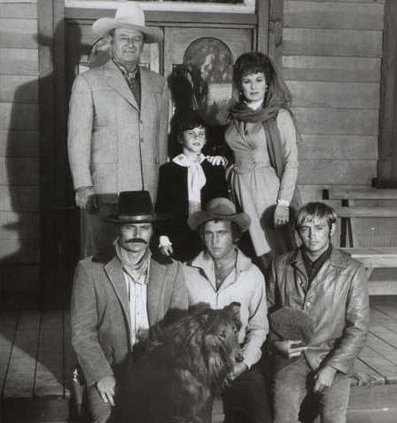You would think appearing in three popular John Wayne westerns in the space of 2 years would ignite a young actor’s career, especially if the actor’s father was Robert Mitchum. And in the early 1970s, Hollywood did indeed seem ready to welcome a new Mitchum to the big screen.
“After ‘Big Jake’ I was on Johnny Carson’s show several times, I was one of Box Office Magazine’s top new actors, and was twice on the cover of Seventeen Magazine,” said Mitchum from Santa Barbara. “Then suddenly, I couldn’t get a job in Hollywood and even my agent didn’t know why.”
So when an offer came to star in a film overseas, Mitchum accepted.
“I went to Spain and made ‘Summertime Killer’ in 1972 with Karl Malden and Olivia Hussey,” he explained. “It was very popular in Europe and Asia, and led to more work offers over there.”
At the time, French actor Alain Delon was a top star in Europe, although he was little known in the U.S.
“He was number 1, and Clint Eastwood, Charles Bronson and myself were 2, 3 or 4 in Europe depending on who had the most recent release,” said Mitchum, who still recalls a publicity tour in Japan for “Summertime Killer.”
“I arrived in Osaka where a wall of police with riot shields lined up to keep back some 2,000 fans trying to see me as I got off the train. It was just crazy.”
After returning to America, Mitchum interviewed for the 1973 crime comedy “Steelyard Blues.”
“The casting director took one look at me and said ‘Oh, you’re THAT Chris Mitchum, I can’t hire you.’ When I asked why not, she said ‘Because you worked with John Wayne.’”
Wayne was a well-known conservative and seen as a supporter of the Vietnam War by the ‘60s anti-war movement, especially after his 1969 film “The Green Berets” which critics regarded as a propaganda film.
But John Wayne was too big to take down, as large in life as he was on screen.
“So liberal Hollywood went after actors who worked with him, and I was blacklisted” said Mitchum. “But Duke loved our troops and couldn’t do enough for them. Today, people understand that you can support our troops but not a war. That wasn’t so clear-cut during Vietnam.”
Like Wayne, Mitchum’s dad was also politically conservative.
“He was also a radical,” said Mitchum. “In fact, Hollywood never really understood my father because of his disdain for Hollywood ‘games’ like campaigning for Oscars.”
Nor did his dad always display tolerance for authority.
“He used to drive up and down Sunset Boulevard at 100 mph – he had a wall covered with speeding tickets! One day, he was in his ’52 XK120 Jaguar and got pulled over. Recognizing him, the cops called up their buddies to come over and meet Robert Mitchum. But dad was in a hurry and getting impatient, so he just took off. They arrested him and it was front-page news the next day. I was kicked out of elementary school to avoid any future bad publicity.”
In the 1970s, Chris continued to star in overseas productions, but also returned to work in America starring in “Stingray” (1978), “The One Man Jury” (1978), and “The Day Time Ended” (1979).
“I also had nine films published overseas and am currently writing a murder mystery that was put on hold while I ran for Congress last year,” noted Mitchum.
While his own star status in the U.S. fell far short of his dad’s, Mitchum accepted the challenges of being the son of a Hollywood icon.
“I don’t believe I ever got an acting job because I was Robert Mitchum’s son,” he said. “In fact, I had to be better than anyone else auditioning for a part so they would hire me because of my performance rather than who I was.”
And even though his father never told him so directly, he knew his dad was proud of his achievements. “I heard it from many friends and people he worked with over the years.”
Mitchum also remembers a story his father would relate after returning from making “The Yakuza” in Japan in 1974.
“During that trip, a girl came up to him and asked ‘Are you Chris Mitchum’s father? Can you get me his autograph?’” recalled Chris. “He loved telling that story.”
Nick Thomas teaches at Auburn University at Montgomery, Ala., and has written features, columns, and interviews for over 550 magazines and newspapers. Follow on Twitter @TinseltownTalks
Tinseltown Talks
Chris Mitchums Journey to Hollywood Part 2





